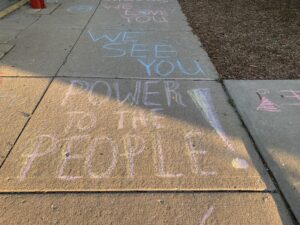We have all been guilty of downplaying the stress in our lives. We tell ourselves things like “it’s ok” and “I can handle it”. In my case, I keep dismissing the signs until finally, it hits me that something is off. I get it, it’s not fun to think about the difficult moments of our day. Especially when we don’t always realize the source of stress. I know I am not alone in sometimes struggling to identify exactly what is off. Did I drink enough water? Did I sleep well last night? Could I be coming down with a cold? But did you know that racism is also a major source of stress for people of color? Many times stress caused by racism is cumulative so it can be hard to trace that uneasy feeling to just one incident. In Grey’s Anatomy, Maggie Pierce described racism as an ever-present buzz in the background. As POC we tend to become desensitized to some of the “ambient noise” of racism that we run into in our daily lives. Small incidents such as insensitive questions about our looks/ clothing, being followed in a store, getting suspicious looks, a cashier assuming we’re paying with food stamps, assumptions about our background- wear us down. We pick and choose our battles to save energy for the more serious offenses. However, even when we do not fully register the stress caused by us navigating the racially charged landscape of life- our body takes every hit and remembers it all.
Weatheringis a theory about how POC can be eroded by the stress of being discriminated against. When I first heard this term I pictured people of color weathering a storm- their souls being beaten down and worn out by constant oppression. Even knowing the impact racism can have on our everyday lives we can dismiss our own struggle because we compare our current situation to others. By telling ourselves things like “someone has it worse” or “this is not as bad as it used to be” we are dismissing the damage being done. Getting perspective is healthy but it should not come at the expense of ignoring the reality of our experiences.
High levels of stress weaken not only our bodies but our minds as well. Just as our immune system struggles to fight off sickness when we are stressed, our minds find it even more difficult to stay healthy. Stress can be a trigger for a relapse of existing mental illness or ignite a new one. Life is stressful enough without the added frustrations of discrimination. Even in subtle forms of communication, we can feel the impact of racist undertones. Taking inventory of how you are feeling and the ways your mental health are affected by microaggressions can help you to more accurately address your stress. Microaggressions are defined as “brief, everyday exchanges that send denigrating messages to certain individuals because of their group membership” (Sue, 2010, p. xvi). When the people we interact withhold racist ideas about the racial group we belong to, they can communicate in ways that belittle us or are insensitive. Such as asking to touch our hair, using slang when speaking with us only and making assumptions based on stereotypes. Many of us have experienced these forms of communication but did not know what to call it. By giving it a name, we are one step closer to identifying and relieving the stress it causes.

If you are dealing with stress caused by racism these tips can help you:
- Seek support from places like community centers
- Spend time with other POC at meetups or community events that can help ease the tension. If you can’t find any, make one! Sharing your experiences can be therapeutic and allow for co-healing
- Find a therapist of color that can understand and support you
- Create a self-care routine that is realistic for you
- Find literature that can be empowering and motivational by authors of color
“Trial and error are needed to find ways of de-stressing that are right for us”
With an open heart, I encourage you to use this knowledge to take care of yourself and your community. We need to remember to check-in with our bodies regularly to get stress under control before it gets to the point of us being torn down.
Sources
ABC Studios production; Shondaland; created by Shonda Rhimes. (2013). Grey’s anatomy. Season 12 Ep 7. Burbank, Calif. : Distributed by Buena Vista Home Entertainment
Sue, D. W. (Ed.). (2010b). Microaggressions in everyday life: Race, gender, and sexual orientation. Hoboken, NJ: John Wiley & Sons.
Torres, L., & Vallejo, L. G. (2015). Ethnic discrimination and Latino depression: The mediating role of traumatic stress symptoms and alcohol use. Cultural Diversity and Ethnic Minority Psychology, 21(4), 517.
http://dx.doi.org/10.1037/cdp0000020
Williams, D. R. (2018). Stress and the Mental Health of Populations of Color: Advancing Our Understanding of Race-related Stressors. Journal of health and social behavior, 59(4), 466-485. https://doi.org/10.1177/0022146518814251
Cover Photo by Markus Spiske on Unsplash


















